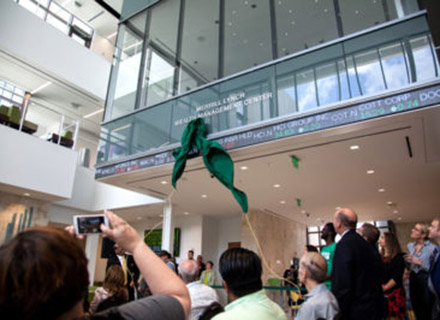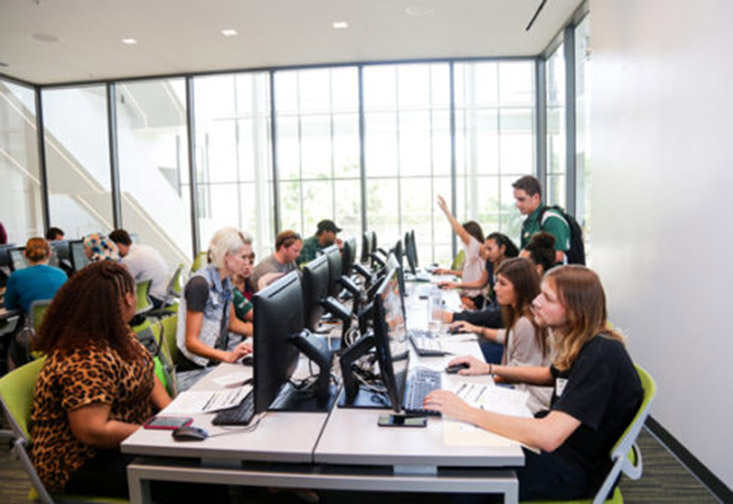When recent alumni gave feedback on USF St. Petersburg’s finance program, some pointed to a particular element that gave them an edge when entering the job market.
“Working in a wealth management center and the direct experience of managing financial investments made them stand out,” said Huijian Dong, Associate Professor of Finance and Director of the Merrill Lynch Wealth Management Center.
More than a year ago, the Bank of America Charitable Foundation gave a $500,000 grant that established the Merrill Lynch Wealth Management Center in the Kate Tiedemann College of Business. Since then, the venue and its faculty are giving college students the tools and ability to manage stock investments while spearheading initiatives that advance financial literacy in the community.
The center is equipped with the resources and technology utilized by financial experts around the world. It features a custom-designed trading room equipped with computers that have extended monitors for vital split-screen display and a LED ticker that streams the latest stock market information and public data powered by St. Petersburg company Intrinio.
The center provides the space for teams of students to use the knowledge they acquire in class to make compelling stock valuations and presentations, earning the right to have their suggested stocks purchased with real money from a student-managed investment fund. That fund, named the Kate Tiedemann Student Managed Investment Fund, was seeded by an initial gift of $250,000 from donors Kate Tiedemann and Ellen Cotton and matched by a $250,000 investment by Lynn Pippenger.
The fund has invested in 11 stocks so far. As the main purpose of the fund is educational, the investors selected a diverse array of companies, where students experience the full range of research, strategies and emotions of financial investing in the stock market.
“Faculty and students work together to pick the stocks we think have qualities that stand out. We then help students polish their thoughts when they pitch their recommendations to a panel of business leaders in the community,” said Dong.

Such programs and student-managed funds have become signature elements of many top-flight business schools around the country and are an invaluable training tool for aspiring financial professionals.
“There is a great need in our community for investment management and financial planning,” said Sri Sundaram, Dean of the Kate Tiedemann College of Business. “The hands-on knowledge you attain from managing a real portfolio is extremely valuable when pursuing careers in finance.”
The student-managed fund, which is very similar to a mutual fund, plays a significant role in bridging the gap between finance theory and investment practice. Students identify and employ strategies to achieve a goal for the fund, and then defend why they are investing in specific securities or commodities. They meet with an advisory group every quarter to receive feedback, defend decisions and are held accountable for those decisions.
Two cohorts of students in finance and investment analysis classes – along with those in a Student Managed Investment Fund group – have utilized the center and its resources to date.
Half of the $500,000 grant from Bank of America went towards operating the Merrill Lynch Wealth Management Center, including bringing on Dong and Xiaomin Guo, an instructor of statistics who manages the center and provides technical and academic support to students and visitors.
The other half supports financial literacy initiatives modeled after Bank of America’s Better Money Habits® curriculum.
“Everyone needs a firm understanding of financial literacy in order to plan for short-term and long-term needs,” said Sundaram.
Back in April, the center welcomed around 20 high school teachers from Pinellas County Schools for a day-long professional development training. These economic teachers, who represent nearly every high school in the county and teach roughly 20,000 students a year, educate their students on personal finance, which has become a curriculum requirement in the state.
“People really first start earning money when they are in high school, but they don’t really understand how to take care of it, or how to responsibly use a credit card or take out student loans,” said Matthew Blum, High School Social Studies Content Supervisor for Pinellas County Schools. “Understanding these concepts are really important to our students because they know they have to learn more about them as they move through life.”
During the training, Dong highlighted the financial literacy resources and assistance available to teachers through the center and detailed core concepts on financial planning and wealth management. He also provided hands-on examples to support the work of teachers when putting together lessons on personal finance.
“Teachers are looking for resources on very practical knowledge to educate their students on things such as how to get a car loan and the interest rate on that loan,” said Dong.
In the coming months and years, the Kate Tiedemann College of Business will use the wealth management center and its resources to further develop curriculum in the fields of financial analysis and investment planning. It also will build out its financial literacy programs, geared towards other sectors of the community and focused on issues such as trust planning and the risk and rewards of different investments.
“Working with our partners like Bank of America, we want to enhance finance literacy in both our student community and the community we live in,” said Sundaram.
